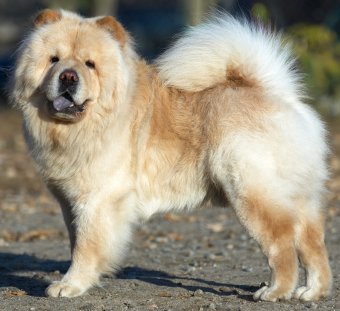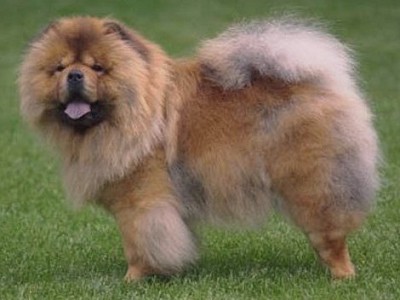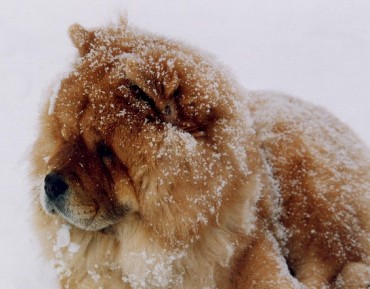Chow Chow Health Care & Feeding
By Michele Welton, Dog Trainer, Breed Selection Consultant, Author of 15 Dog Books

Start your Chow Chow off on the right foot by feeding the right food, giving the right vaccinations, finding the right vet, and if you're going to spay or neuter, don't do it too early.
Jump down to this list of
Chow Chow Health Problems
Or check out my advice for raising a healthy Chow Chow puppy or adult dog:
 Dog Health Care – The Sensible Way
Dog Health Care – The Sensible Way
Read my advice on daily health care so your Chow lives a long, healthy life and seldom needs to see the vet... [read more]
 3 Best Ways To Feed Your Dog Healthy Food
3 Best Ways To Feed Your Dog Healthy Food
You can dramatically increase your dog's chances of living a long, healthy life by feeding the right food. Cutting right to the chase, the best foods for your Chow Chow are... [read more]
 A Quick Way To Make Homemade Dog Food
A Quick Way To Make Homemade Dog Food
Your Chow will love real chicken, turkey, beef, fish, eggs, yogurt, broccoli.... this is not just "people food" and I'll tell you why... [read more]
 5 Best Kibble and Canned Dog Foods
5 Best Kibble and Canned Dog Foods
Some are better than others, but I must be honest – I'm not a huge fan of dry or canned dog food. Here are my concerns... [read more]
 Vaccinations and Booster Shots: Needed or Not?
Vaccinations and Booster Shots: Needed or Not?
How many vaccinations does your Chow Chow puppy really need? Does your adult dog need yearly booster shots? The vaccination guidelines have changed! Find out what some vets aren't telling you... [read more]
 Spaying Your Female Dog: Pros and Cons
Spaying Your Female Dog: Pros and Cons
Should your female Chow be spayed? Current research says, "The AGE at which you spay can be vitally important to your dog's future health." So what's the best age? [read more]
 Neutering Your Male Dog: Pros and Cons
Neutering Your Male Dog: Pros and Cons
Have you been told that you must neuter your male Chow? Current research shows that the issue is not so simple. Pet owners are not being told about some risks associated with neutering male dogs, especially neutering too early... [read more]
 Make Sure Your Vet is the Best!
Make Sure Your Vet is the Best!
Is your current veterinarian really the best choice for your dog? Here's how to tell... [read more]
 Assisi Loop Review
Assisi Loop Review
Does your Chow suffer from arthritis, hip dysplasia, disk disease, colitis? My honest review of a veterinary device you can use at home to reduce inflammation and pain. [read more]

Complete list of Chow Chow health problems
This breed is an orthopedic nightmare, and their eyes and skin aren't much better.
Orthopedic diseases in Chow Chows
- The Orthopedic Foundation of America evaluated the hip X-rays of 5700 Chow Chows and found 21% dysplastic. That's very high for a medium-sized dog. Ignore any breeders who tell you, "A Chow's hips are perfectly normal for the breed". Dysplastic hips are deformed and lead to arthritis later in life.
- Elbows are even worse – with over 1100 X-rays submitted, the Chow has a 48% rate of elbow dysplasia – the worst rate of all breeds.
- Chows have an 8% rate of luxating patella (loose knee joints) – the 9th worst rate of all breeds.
- Cruciate ligament rupture occurs regularly in Chow Chows, because breeders insist on their dogs having abnormally straight hind legs with tight ligaments. In this breed, sometimes all it takes is an awkward run up the stairs to tear their ligament. Surgery is expensive!
Eye diseases in Chow Chows
The deep-set eyes with their loose eyelids are prone to eye diseases, especially entropion (rolled-in eyelids), but also ectropion (rolled-OUT eyelids), cataracts, corneal dystrophy, glaucoma, persistent pupillary membranes (which can severely impair vision in this breed), retinal dysplasia, eyelash abnormalities, and occasionally progressive retinal atrophy (PRA).
Throat disorders in Chow Chows
Their soft palate (the flap of skin across the back of the throat that prevents food and water from entering the windpipe) is often fleshy and elongated and tends to fall loosely into the throat. This causes noisy breathing and chronic snoring and makes it tricky to anesthetize this breed safely.
Skin and coat conditions in Chow Chows
The thick coat and skin folds are prone to chronic skin diseases: allergies, bacterial skin infections (pyoderma), demodectic mange, follicular dysplasia, pemphigus, and in blue Chows, color dilution alopecia.
Bloat in Chow Chows
As with all deep-chested breeds, Chow Chows are at higher-than-normal risk for the emergency gastrointestinal syndrome called bloat.
Miscellaneous
According to the Michigan State University Thyroid Database, up to 14% of Chow Chows have hypothyroidism.
Other health issues that occur regularly in Chow Chows are colitis and hernias.

Health problems in hot climates
This is a cold-climate breed. It's astonishing that some people in states like Florida, Arizona, and Alabama will acquire a Chow puppy without ever considering how unfair that is to the dog.
With their thick coat and compromised respiratory system, Chows suffer in hot climates and are vulnerable to heatstroke. Even in moderately hot climates, vigorous summer exercise should be limited to morning and evening.
Many owners have their Chows shaved for the summer. There are two potential problems with this practice:
- Sunburn. To guard against sunburn, leave the coat at least two inches long. Certainly some breeds have shorter hair than two inches, but in those breeds, their skin is accustomed to the sun.
The skin of a long-coated or thick-coated dog is accustomed to being protected from the sun. If you suddenly remove that protective layer of hair, the skin is more likely to burn. And dogs can get skin cancer just like people.
- Hair loss. If you cut a thick coat too short, you can damage the hair follicles. Then an odd skin condition called post-clipping alopecia (al-lo-PEE-shee-ah) can develop.
It's characterized by hair loss and then abnormal hair growth. Typically the coat doesn't return to normal for six to twelve months. Sometimes it never becomes normal.
Post-clipping alopecia is most common in thick-coated furry spitz breeds such as Chows, Alaskan Malamutes, Keeshonds, Pomeranians, etc. But it can also occur in hairy breeds such as Golden Retrievers and Newfoundlands.
Honestly, it's safer to use air conditioning, fans, and cool wet towels to keep these breeds comfortable in the summer. Better yet, don't try to fit a round dog into a square hole. In other words, in a hot climate, don't get a cold-climate dog.
Preventing health problems
Some health problems are inherited. For example, if your dog inherits from his parents the genes for an eye disease called PRA, he will go blind and there's nothing anyone can do about it.
 But most health problems can be prevented by the ways you raise your dog.
But most health problems can be prevented by the ways you raise your dog.
FREE eBOOK! My free online health care program, 11 Things You Must Do Right To Keep Your Dog Healthy and Happy shows you how to raise your Chow Chow in all the right ways that help prevent health problems. Become your dog's health care champion!
My best-selling books – now available FREE on my website
 Respect Training For Puppies: 30 seconds to a calm, polite, well-behaved puppy is for puppies 2 to 18 months old. Your puppy will learn the 21 skills that all family dogs need to know. Click here to read for free.
Respect Training For Puppies: 30 seconds to a calm, polite, well-behaved puppy is for puppies 2 to 18 months old. Your puppy will learn the 21 skills that all family dogs need to know. Click here to read for free. Teach Your Dog 100 English Words is a unique Vocabulary and Respect Training Program that will teach your adult dog to listen to you and do what you say. Click here to read for free.
Teach Your Dog 100 English Words is a unique Vocabulary and Respect Training Program that will teach your adult dog to listen to you and do what you say. Click here to read for free. 11 Things You Must Do Right To Keep Your Dog Healthy and Happy helps your dog live a longer, healthier life. Get my honest advice about all 11 Things before you bring home your new puppy, because some mistakes with early health care cannot be undone. Click here to read for free.
11 Things You Must Do Right To Keep Your Dog Healthy and Happy helps your dog live a longer, healthier life. Get my honest advice about all 11 Things before you bring home your new puppy, because some mistakes with early health care cannot be undone. Click here to read for free.

